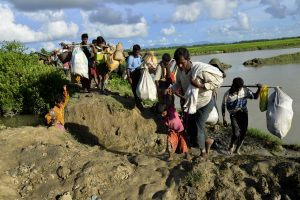Rohingya Muslims may have crossed into Bangladesh in recent weeks in a bid to escape the intensifying fighting between the Myanmar military and the Arakan Army (AA), according to a Bangladeshi official.
Bangladesh is already home to around 1 million Rohingya, most of whom were driven out of Myanmar’s Rakhine State during the “clearance operation” launched by the Myanmar military, one that many view as genocidal. Growing increasingly frustrated with the seeming permanence of the sprawling refugee camps dotted around the city of Cox’s Bazar in southeastern Bangladesh, Dhaka says that it will not permit any more Rohingya to enter the country.
However, in a report on Friday, Reuters quoted Mohammed Mizanur Rahman, the country’s chief of refugee relief and repatriation, as saying that he had received reports that some civilians had managed to get across the border.
“Some people have managed to enter Bangladesh in various ways and have taken refuge in different places,” Rahman told the news agency. “I believe some people are being allowed to enter unofficially.”
Fighting is currently raging across the northern part of Rakhine State, in Myanmar’s west, as the AA, the armed wing of the United League of Arakan, seeks to expel the Myanmar army’s remaining forces from the area. The AA, which seeks to create an independent state for the Rakhine Buddhist minority, has made significant gains in Rakhine State since the collapse of a ceasefire with the military junta in November, and now claims to exercise primary control over nine of the state’s 17 townships.
In mid-May, it captured the town of Buthidaung in the northern part of Rakhine State, after weeks of fighting. This was followed by a wave of arson attacks that reduced large parts of the town to ash, forcing tens of thousands to flee. Rohingya eyewitnesses claimed that the AA was responsible for the attacks; the group vociferously denied the claims, blaming junta air and artillery strikes.
Last week, the AA announced that it was closing in on the town of Maungdaw, which shares a long border with Bangladesh, and called on the town’s residents to “urgently” evacuate.
Given what happened in Buthidaung, this announcement gave rise to immediate concerns that the evacuation order was a prelude to further displacement of the Rohingya population of Maungdaw, many of whom are survivors of the 2017 “clearance operation.”
With the main exit routes from Maungdaw blocked, around 70,000 Rohingya are currently trapped there awaiting the final showdown between the Myanmar military and the AA.
United Nations human rights chief Volker Turn has also publicly expressed his concerns about the situation in Maungdaw. “Rohingya have no options,” he said. “There is nowhere to flee.” One resident of Maungdaw concurred, stating to Reuters, “We have nowhere to go, no safe zone, not enough food and basic necessities.”
All of this has raised fears that the AA’s evacuation order was its way of disavowing responsibility for Maungdaw’s Rohingya population if and when it captures the town. In a statement on June 18, the Special Advisory Council on Myanmar stated that “The evacuation notice of 16 June and impending attacks in Maungdaw, and rhetoric of senior members of the AA, give cause for concern over a possible intention on the part of the AA to forcibly transfer the Rohingya population from Rakhine state.”
The Reuters report seems to suggest that running the gauntlet of the Bangladeshi border authorities, and entering the limbo of the refugee community in Cox’s Bazar, may well be the least worst option available to those seeking sanctuary from the conflict that has once again consumed northern Rakhine State.

































